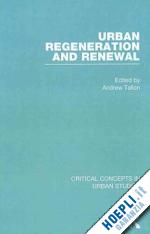
Questo prodotto usufruisce delle SPEDIZIONI GRATIS
selezionando l'opzione Corriere Veloce in fase di ordine.
Pagabile anche con Carta della cultura giovani e del merito, 18App Bonus Cultura e Carta del Docente
The pursuit of regeneration and renewal has played an important role in the history and development of the world’s cities, and the theoretical and applied issues around these critical concepts are of increasing importance to governments and local populations, as well as to urban professionals and scholars. Particularly in postwar North America and Western Europe, this growing concern has often resulted from the decay and deterioration of cities associated with the decline in traditional industries and the associated loss of employment, and populations, to the suburbs and beyond.
This new title in the Routledge series, Critical Concepts in Urban Studies, meets the need for an authoritative reference work to make sense of the explosion in research output on regeneration and renewal as a significant historical and contemporary urban process of economic, social, cultural, and political importance. Edited by a leading scholar, this Routledge Major Work brings together in four volumes the canonical and the best cutting-edge scholarship on the topic.
The collection is divided into three principal parts. Part 1 (‘Cities in Transition’) covers the wider social, economic, political, and urban geographical context for urban regeneration and renewal, and documents the nature of changing cities. These processes and changes are inextricably linked with urban regeneration and renewal initiatives, and an understanding of these transitions is essential to place Parts 2 and 3 in perspective. Part 2 (‘Responses to Urban Change from National Governments’) brings together the best overviews and critiques of urban policy initiatives implemented by central governments in developed countries during the postwar period. The materials gathered here span experiences and city examples from advanced economies across the world.
The final part (‘City Responses to Urban Change’) draws on the approaches taken by cities themselves in response to urban problems, particularly those designed to improve economic competitiveness and to combat social exclusion. Key research on the wide array of thematic approaches that have been followed is assembled in this part. Within the wider urban processes explored in Part 1, this part examines particular policy responses that have arisen in many cities, and considers a number of case-study cities from the UK, North America, continental Europe, and Australasia.
With a full index, together with a comprehensive introduction, newly written by the editor, which places the collected material in its historical and intellectual context, Urban Regeneration and Renewal is an essential work of reference. It is destined to be valued by scholars, students, and researchers as a vital research resource.
Volume 1: Part 1: Cities in Transition Globalization and Urban Competitiveness. From Managerialism to Urban Entrepreneurialism. Social Capital, Exclusion, Cohesion, and Diversity. Urban Governance and the Post-Fordist City. Volume 2: Postmodernism and Urban Space: Part 2: Responses to Urban Change from National Governments Postwar Physical Redevelopment and Area-Based Social Welfare Projects. Entrepreneurial and Property-Led Regeneration. Economic Competition in Urban Policy. Combining Economic Development and Social Justice in Urban Policy. Evaluating National Government Urban Regeneration and Renewal Policies. Volume 3: Part 3: City Responses to Urban Change Place Marketing. Expanding the Leisure and Cultural Economies. Creative Cities and Creative Industries. Sport and Regeneration. City Centre Retail Regeneration. Volume 4: Housing-Led Regeneration and Gentrification Community Involvement in Urban Regeneration Partnerships. Urban Sustainable Development and Sustainable Communities.











Il sito utilizza cookie ed altri strumenti di tracciamento che raccolgono informazioni dal dispositivo dell’utente. Oltre ai cookie tecnici ed analitici aggregati, strettamente necessari per il funzionamento di questo sito web, previo consenso dell’utente possono essere installati cookie di profilazione e marketing e cookie dei social media. Cliccando su “Accetto tutti i cookie” saranno attivate tutte le categorie di cookie. Per accettare solo deterninate categorie di cookie, cliccare invece su “Impostazioni cookie”. Chiudendo il banner o continuando a navigare saranno installati solo cookie tecnici. Per maggiori dettagli, consultare la Cookie Policy.